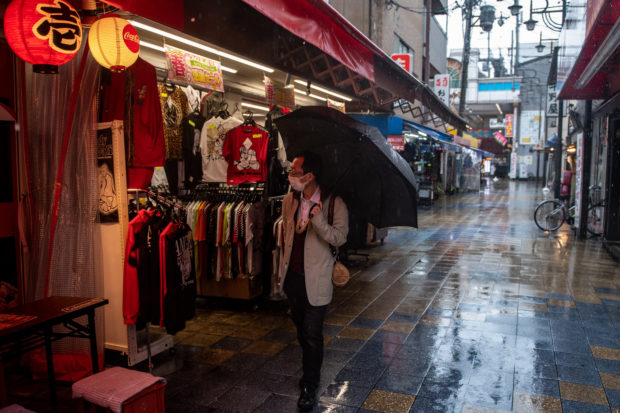Japan eases rules on going out for necessities during self-isolation period

A man walks along Shinsekai shopping street in Osaka on April 17, 2021, as record numbers of new Covid-19 infections were reported in the city in recent days. (Photo by Philip FONG / AFP)
TOKYO — The Japanese government has announced the easing of requests to refrain from going outside for people in self-isolation because they have been infected with the novel coronavirus.
Such infected people are now allowed to go out to shop for groceries for short periods of time as long as conditions are met, such as the wearing of masks.
The shortening of the isolation period, announced by Prime Minister Fumio Kishida on Tuesday, and the relaxation on the going-out requests went into effect Wednesday, including for people currently in self-isolation.
The government decided on the relaxation based on discussions at a meeting of an advisory body to the Health, Labor and Welfare Ministry held Wednesday.
“We need to monitor the risks, but we also need to increase economic and social activities,” health minister Katsunobu Kato said during a press conference after the meeting.
Article continues after this advertisementThe Infectious Diseases Law requires persons infected with the virus to self-isolate at home or in an accommodation facility, even if hospitalization is not necessary. The infected people are urged not to go out during the isolation period and to report their health condition to their local government.
Article continues after this advertisementUnder the relaxation, asymptomatic infected people are allowed to go out from the first day of their isolation period, while those with symptoms can go out 24 hours after their condition improves, such as when their fever abates without medication. However, these people are allowed to go out only for the minimum necessary amount of time, such as shopping for groceries and daily necessities, on the condition that they wear a mask and do not use public transportation.
The self-isolation period has been reduced from 10 days in principle to seven days for symptomatic patients. The isolation period for asymptomatic patients is seven days, but with the relaxation, it will end on the sixth day if a test taken on the fifth day turns out negative.
Kato said that while the risk of infection remains with the shortened period of self-isolation, “the overall risk will be lowered” by urging infected people to take infection prevention measures such as checking their temperature and refraining from contact with elderly people over a period of seven to 10 days.
RELATED STORIES
Japan starts to ‘name and shame’ quarantine rule-breakers
For more news about the novel coronavirus click here.
What you need to know about Coronavirus.
For more information on COVID-19, call the DOH Hotline: (02) 86517800 local 1149/1150.
The Inquirer Foundation supports our healthcare frontliners and is still accepting cash donations to be deposited at Banco de Oro (BDO) current account #007960018860 or donate through PayMaya using this link.